

Daring ocelot forges pact. Five Expressions of Empathy. The Problem Facing Young Men That Needs To Become A Household Conversation. How to Foster Grit, Tenacity and Perseverance: An Educator’s Guide. Culture Teaching Strategies Getty How can we best prepare children and adolescents to thrive in the 21st century?
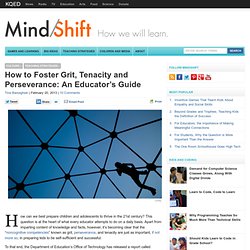
This question is at the heart of what every educator attempts to do on a daily basis.
All Work and No Play: Why Your Kids Are More Anxious, Depressed - Esther Entin. For more than fifty years, children's free play time has been continually declining, and it's keeping them from turning into confident adults What are your memories of playing as a child?
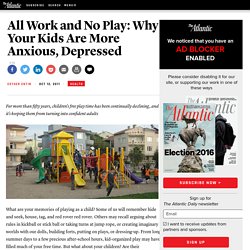
Some of us will remember hide and seek, house, tag, and red rover red rover. Others may recall arguing about rules in kickball or stick ball or taking turns at jump rope, or creating imaginary worlds with our dolls, building forts, putting on plays, or dressing-up. From long summer days to a few precious after-school hours, kid-organized play may have filled much of your free time. But what about your children? Play time is in short supply for children these days and the lifelong consequences for developing children can be more serious than many people realize.
Gray describes this kind of unstructured, freely-chosen play as a testing ground for life. Parents who hover over and intrude on their children's play are a big part of the problem, according to Gray. 1. 2. 3. 4. 5. Image: Wikimedia Commons. 25 Ways to Talk So Children Will Listen. A major part of discipline is learning how to talk with children.
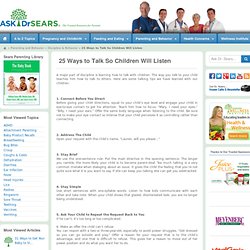
The way you talk to your child teaches him how to talk to others. Here are some talking tips we have learned with our children: 1. Connect Before You Direct Before giving your child directions, squat to your child’s eye level and engage your child in eye-to-eye contact to get his attention. 2. Open your request with the child’s name, “Lauren, will you please…” 3.
We use the one-sentence rule: Put the main directive in the opening sentence. 4. Use short sentences with one-syllable words. 5. If he can’t, it’s too long or too complicated. 6. You can reason with a two or three-year-old, especially to avoid power struggles. 7. Instead of “no running,” try: “Inside we walk, outside you may run.” 8. Instead of “Get down,” say “I want you to get down.” 9. “When you get your teeth brushed, then we’ll begin the story.” 10. Instead of hollering, “Turn off the TV, it’s time for dinner!” 11. 12. 13. 14. 15. 16. 17. The secret of self-control. In the late nineteen-sixties, Carolyn Weisz, a four-year-old with long brown hair, was invited into a “game room” at the Bing Nursery School, on the campus of Stanford University.

The room was little more than a large closet, containing a desk and a chair. Carolyn was asked to sit down in the chair and pick a treat from a tray of marshmallows, cookies, and pretzel sticks. Carolyn chose the marshmallow.
The secret of self-control. Tools of the Mind. Increase Your Child’s Emotional Intelligence. We all like to think our children are academically intelligent, and perhaps yours does show an early affinity for numbers or is reading at a 2nd grade level while still in kindergarten.

But is he also emotionally intelligent? Will he take it in stride when the cafeteria is out of chocolate milk, or will he stage a nuclear meltdown right there in the lunch line? Being able to control impulses, delay gratification, and identify and manage feelings are all skills that fall under the category of “emotional intelligence.” Try sticking around for a while after drop-off one morning to examine your child’s behavior on the playground. How well does she interact with others? Emotion Coaching: One of the Most Important Parenting Practices in the History of the Universe. According to John Gottman, one of my all-time favorite researchers, emotion-coaching is the key to raising happy, resilient, and well-adjusted kids.

His research—30 years of it—shows that it is not enough to be a warm, engaged, and loving parent. We also need to emotion coach our kids. Emotion-coached kids tend to experience fewer negative feelings and more positive feelings. The three steps below are adapted from Gottman's book Raising an Emotionally Intelligent Child, which I can't recommend highly enough. The 5-Minute Solution - by Scott Noelle, Parenting Coach. The scene: I was working diligently at the computer in my home office when my 2.5-year-old daughter, Willow, approached my desk and grabbed a pile of 4x6-inch photos that I had carelessly left within her reach.
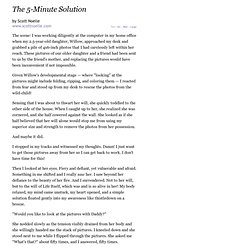
These pictures of our older daughter and a friend had been sent to us by the friend's mother, and replacing the pictures would have been inconvenient if not impossible. Given Willow's developmental stage — where "looking" at the pictures might include folding, ripping, and coloring them — I reacted from fear and stood up from my desk to rescue the photos from the wild-child! Sensing that I was about to thwart her will, she quickly toddled to the other side of the house. Parenting Tips For Raising Successful Kids. Tags: parenting style, parenting styles 353EmailShare If You Wish To Use This Graphic On Your Blog Please Feel Free.

Just Copy & Paste The Code Below: 10 Scientific Tips For Raising Happy Kids. Good books on parenting styles & effects. 'NurtureShock' Parenting Tips: Why Praising Your Kids Can Hurt Them. For writer and father Po Bronson, yelling praise from the sidelines of a soccer game to his child has always been part of his parental territory.
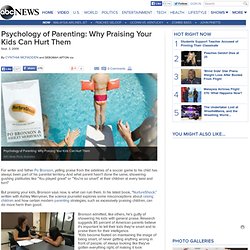
And what parent hasn't done the same, showering gushing platitudes like "You played great" or "You're so smart" at their children at every twist and turn? But praising your kids, Bronson says now, is what can ruin them. Raising An Emotionally Intelligent Child - John Gottman. The Scientist in the Crib: What Early Learning Tells Us About the Mind: Alison Gopnik,Andrew N. Meltzoff,Patricia K. Kuhl: 9780688177881: Amazon.com.